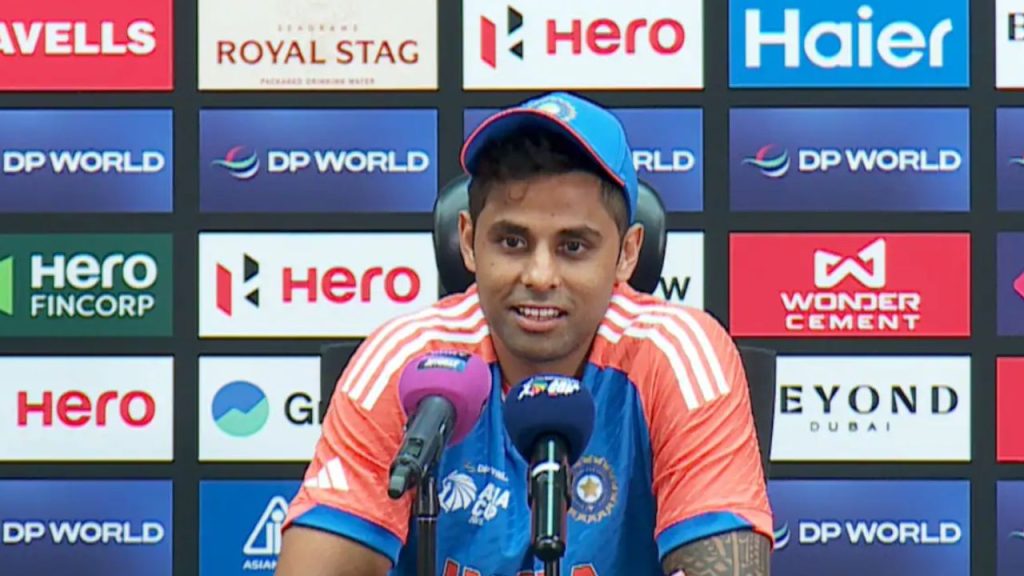In the sweltering heat of Dubai International Cricket Stadium on September 21, 2025, the Asia Cup Super 4s stage witnessed yet another chapter in the storied saga of India versus Pakistan. What unfolded was not a nail-biting thriller but a clinical dissection: India chased down Pakistan’s 171/5 with six wickets and seven balls to spare, powered by a blistering 105-run opening stand between Abhishek Sharma and Shubman Gill. Abhishek’s explosive 74 off 39 balls set the tone, while Tilak Varma’s unbeaten 30 sealed the deal. For Pakistan, Sahibzada Farhan’s gritty 58 offered brief resistance, but the innings crumbled under India’s bowling pressure, particularly Shivam Dube’s game-changing spell of 2/33 that snuffed out the openers.
Post-match, as the echoes of Indian cheers faded, captain Suryakumar Yadav dropped a bombshell in the press conference that has cricket pundits and fans buzzing. Responding to a Pakistani journalist’s query on whether Pakistan had competed better this time, Suryakumar didn’t mince words. “I would like to say something on this question,” he began, his tone measured yet firm. “You guys should stop asking questions about the rivalry between India-Pakistan. According to me, if two teams play 15-20 matches and it’s 7-7 or 8-7, then it’s called a rivalry. But 13-0, 10-1… I don’t know what the stat is, but this is not a rivalry anymore.” He paused, then added, “I feel we played better cricket than them, and also from a bowling point of view.” The room fell silent; the air thick with the weight of his candor.
Suryakumar’s remarks weren’t born in a vacuum. They stem from a head-to-head ledger that’s increasingly lopsided, painting a picture of dominance rather than deadlock. In ODI World Cups, India boasts a flawless 13-0 record against Pakistan, a streak unbroken since their first encounter in 1992. In T20 World Cups, it’s 10-1, with Pakistan’s lone victory dating back to 2021. Across all formats in the last 15 years, India has won 23 of 31 meetings, including seven straight since September 2022—starting with that infamous Asia Cup Super 4 loss, but rebounding emphatically ever since. This Super 4 triumph marks India’s second win over Pakistan in the ongoing Asia Cup, the first coming in the group stage amid a handshake controversy that underscored the off-field tensions.
The “rivalry,” once the pinnacle of cricket’s emotional theater, has evolved—or devolved—into something more predictable. Historically, India-Pakistan clashes were electric, fueled by partition’s scars, border skirmishes, and the sheer cultural heft of two nations glued to their screens. Matches like the 1999 World Cup thriller at Old Trafford or the 2007 T20 World Cup semi-final evoked raw passion, where underdogs could upend giants. But in the post-2010 era, India’s ascent—bolstered by IPL-forged talent pipelines, superior fitness regimes, and tactical acumen—has tilted the scales. Pakistan’s sporadic brilliance, often from players like Babar Azam or Shaheen Afridi, gets overshadowed by inconsistencies in batting depth and fielding lapses. In this match, four dropped catches by India were a rare blemish, one Suryakumar vowed to address before the Bangladesh fixture.
Suryakumar’s blunt assessment echoes a growing sentiment in Indian cricket circles. On X (formerly Twitter), reactions poured in like a digital deluge. One user quipped, “Rivalry can’t be one-sided… many Indians stopped caring about this,” reflecting a fatigue among fans who once treated these games as festivals. Another post from a cricket news handle highlighted the stats: “13-0 (ODI World Cups), 10-1 (T20 World Cups)—India’s dominance over Pakistan is unmatched.” Pakistani fans, predictably, bristled; threads debated if it was “confidence or arrogance,” with some conceding the embarrassment of empty stadiums in Dubai, dominated by Indian supporters. Reddit’s r/Cricket subreddit lit up with 364 upvotes on a thread titled “This is not a rivalry anymore,” where users drew parallels to lopsided derbies like Arsenal-Tottenham, minus the geographic bite.
Yet, for all its one-sidedness, the fixture retains a magnetic pull. Viewership in India might be dipping—blame T20 fatigue or competing leagues—but globally, it’s a cash cow for broadcasters. The Asia Cup, co-hosted by Pakistan and Sri Lanka but shifted to neutral venues due to geopolitical strains, thrives on this hype. Suryakumar himself acknowledged the game’s turning point: the drinks break in Pakistan’s innings at 91/1 after 10 overs. What followed was a stranglehold— just 38 runs in the next seven, the tournament’s lowest in that phase—thanks to Dube’s variations and Varun Chakravarthy’s guile. “That was the decisive phase,” Suryakumar noted, shifting focus from narrative to nuts-and-bolts cricket.
Critics might label Suryakumar’s words as hubris, a psychological jab at a neighbor grappling with internal turmoil. Pakistan captain Salman Ali Agha, in a terse post-match huddle, avoided direct retort, instead lamenting dropped chances and batting collapses. But Suryakumar, ever the 360-degree player turned tactician, framed it as realism. At 35, he’s no stranger to pressure; his own duck in the chase was a footnote to the team’s depth. With Abhishek’s emergence and Gill’s class, India’s T20 unit looks invincible, a far cry from the 2022 upset that still haunts Pakistani lore.
As India eyes the Asia Cup final—potentially against Sri Lanka or Bangladesh—the “rivalry” label hangs in limbo. Suryakumar’s verdict challenges the romance: if rivalry demands reciprocity, this is mismatch masquerading as myth. For Pakistan, it’s a clarion call to rebuild; for India, a reminder that complacency lurks in dominance. In cricket’s grand tapestry, where stats often trump stories, Suryakumar has redrawn the lines. Not with malice, but with the quiet authority of a winner who’s seen enough to know: true battles aren’t won on paper, but they’re certainly tallied there. Whether this buries the hype or reignites it remains the next plot twist. For now, India marches on, rivalry or not.

